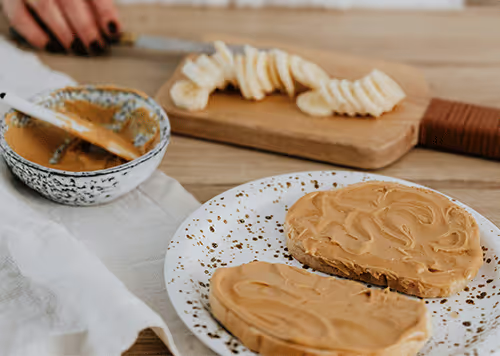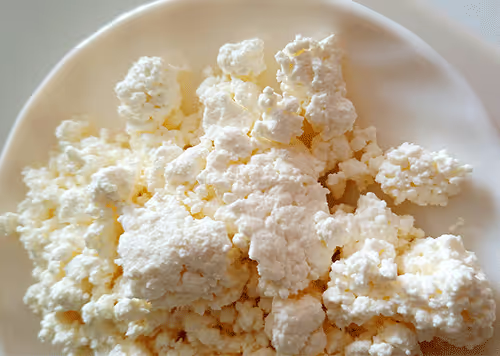Here's the scoop: This is how much protein is in peanut butter
Time to crack the (peanut) shell and find out.


Key takeaways
- Peanut butter contains around 4 grams of protein per tablespoon, making it a decent plant-based protein source. Some brands even offer protein-enriched options with up to 7 grams per tablespoon, but portion control is essential due to their calorie density.
- Rich in healthy fats, vitamin E, magnesium, and niacin, peanut butter supports energy, skin health, and appetite regulation. Its combination of protein, fat, and fibre helps curb hunger, making it a satisfying addition to a balanced diet when consumed in moderation.
- Despite being calorie-dense, peanut butter can support weight loss when eaten in controlled portions (1-2 tablespoons daily). Its ability to keep you fuller for longer and stabilise blood sugar makes it a smart, nutrient-rich choice for weight management.
Let’s be honest: peanut butter is the poster child of “healthy but dangerous” foods. A tablespoon? Reasonable. 2 tablespoons? Fine. A casual 6 spoonfuls straight from the jar while standing in front of the fridge? We’ve all been there.
But beyond the creamy, salty taste lies an important question for anyone navigating their weight loss journey: Is peanut butter actually a good source of protein?
From gym bros to health influencers, natural peanut butter is often on the ‘good fats’ list. But how much protein does it actually contain? Can it support your protein intake goals if you’re trying to lose weight or build lean muscle?
And is that tablespoon of joy a protein-packed powerhouse, or simply a glorified treat in disguise? Time to crack the (peanut) shell and find out.
Is peanut butter a good source of protein?
Short answer: yes, but with a few caveats. Natural peanut butter contains around 3.5 to 4 grams of protein per tablespoon, which is a decent amount for such a compact serving [1].
It also brings along a good source of healthy fats, vitamin E, magnesium, and niacin — nutrients that support energy and other health functions. When compared to sugary spreads or other ultra-processed snacks, it's practically a nutritional saint.
However, peanut butter is also calorie-dense, which means portion control matters. For those on a weight loss diet, it’s best to think of peanut butter as a helpful co-star rather than the protein-packed lead.
It’s an easy way to add flavour and texture to snacks and meals, especially when combined with lean protein, whole grains, or fibre-rich foods for a balanced meal. While it's not a complete protein, peanut butter is a great option for plant-based proteins, adding a decent protein and fat boost for those on a plant-based diet.
How much protein is in a tablespoon of peanut butter?
One tablespoon of peanut butter — about 16g — contains roughly 4g of protein. Chunky, creamy, or organic, the plant protein content doesn't vary dramatically across most brands [1].
Some brands now offer peanut butter with added protein, giving you an extra boost per serving. Some even offering up to 7g per tablespoon. These are great if you're looking to sneak a little more protein into your snacks without adding another egg to your day.
What else is in a tablespoon of peanut butter?
One tablespoon (about 16g) clocks in at around 94 calories and comes loaded with healthy fatty acids, fibre, and a surprising dose of essential vitamins and minerals [1].
- Protein: ~4g
- Total fat: ~8g
- Saturated fat: ~1.7g
- Carbohydrates: ~3g
- Sugars: ~1.5g (varies by brand)
- Fibre: ~1g
- Vitamin E: ~2.4mg (16% daily)
- Niacin (Vitamin B3): ~2.1mg (13% daily value)
- Magnesium: ~50mg (12% daily value)
- Potassium: ~104mg (2% daily value)
- Sodium: ~2.5mg (depends on added salt)
- Iron: ~0.3mg (2% DV)
Note: Nutritional values may vary slightly between brands, especially between natural peanut butter and varieties with added sugars, salt, or oils.
Health benefits of peanut butter
Peanut butter is a surprisingly nutrient-rich addition to a balanced diet. When eaten in moderation, it delivers a range of health benefits that go well beyond simply tasting delicious.
From supporting weight loss to nourishing your nervous system, this humble spread is doing more heavy lifting than it gets credit for [2].
It's rich in healthy fats and essential nutrients
Natural peanut butter (we’re talking the kind with no added sugar, salt, or other ingredients you can’t pronounce) is a good source of healthy fats. Specifically, natural peanut butter contains monounsaturated and polyunsaturated fats.
It's also packed with vitamin E, niacin, magnesium and essential amino acids, all nutrients that support several health functions, including skin health [3].
If you opt for mineral-fortified or vitamin-enriched brands, you’re getting even more bang for your nutritional buck. Just be sure to give that label a scan and choose natural peanut butter or pure peanut butter whenever possible.
It helps curb hunger
Peanut butter is surprisingly filling for something that tastes like dessert. Thanks to a smart balance of protein, fat, and a bit of dietary fibre, it helps keep hunger pangs at bay.
This means you're less likely to go raiding the biscuit tin an hour later. When paired with lean protein or whole grain toast, it makes a satisfying snack that won't send your blood sugar on a rollercoaster ride.
That’s the magic of eating peanut butter in moderation — it satisfies sweet cravings and helps regulate food intake, supporting weight maintenance without sacrificing taste.
It may support weight loss goals
Peanut butter often gets unfairly labelled as a “weight gain” food due to its calorie content. But when used in appropriate portions, it can aid weight loss. By keeping you fuller for longer and preventing overeating later in the day, peanut butter might just be the underdog hero of your weight loss diet.
Research suggests that including nutritious, calorie-dense foods like peanut butter in a calorie-controlled diet may help people lose weight, or at least avoid that frustrating plateau [4].
The key? Moderation. Stick to one tablespoon at a time, and you’ll be more likely to support weight management rather than sabotaging it and leading you to gain weight.
Are there nutritional differences between chunky and smooth peanut butter?
When it comes to chunky vs smooth, the nutritional differences are marginal — we’re talking tiny variances, not a dramatic health divide. Both varieties generally offer similar amounts of protein, fat, calories, and fibre per tablespoon.
Chunky peanut butter might give you a touch more fibre thanks to the peanut pieces, while smooth can sometimes spread more easily if you’re watching portions.
Just keep an eye on the label, as some brands sneak in added sugars, salt, or oils. The real choice here comes down to texture preference — are you a crunch connoisseur or a smooth spread devotee?
How to turn peanut butter into a filling snack
Not only does peanut butter feel indulgent, but it’s endlessly customisable. Add a spoon to your Greek yoghurt, swirl it into overnight oats or porridge, blend it into a smoothie, or drizzle it over fruit.
You can even use it to make a protein-rich satay sauce or combine it with natural sweeteners like banana or honey for a healthier dessert. And while chunk style or creamy peanut butter is a matter of personal preference, both types deliver roughly the same protein content, so pick your fighter.
Here are some delicious and satisfying peanut butter snack combos, with rough calorie counts to help you stay mindful:
- 1 tbsp peanut butter + 1 medium banana – around 180 calories
- 1 tbsp peanut butter + 2 rice cakes – around 170 calories
- 1 tbsp peanut butter + 150g Greek yoghurt + cinnamon – around 220 calories
- 1 tbsp peanut butter + celery sticks – around 120 calories
- 1 tbsp peanut butter blended into a smoothie (with frozen banana + almond milk) – around 250 calories
- 1 tbsp peanut butter drizzled on apple slices – around 180 calories
- Homemade satay sauce with peanut butter + tofu + veggies – around 300 calories per serving
Is it OK to eat 2 tablespoons of peanut butter a day?
For most people, eating 2 tablespoons of peanut butter a day can be part of a healthy, balanced diet, even when you’re trying to lose weight.
Those 2 tablespoons offer around 190–200 calories and about 8g of protein, plus a good hit of healthy fats to keep you feeling full between meals. The key is moderation (and checking your labels for added sugar, salt, or oils), especially if you're adding it to other calorie-dense foods.
Is peanut butter good for a weight loss journey?
Peanut butter gets a bad rap when it comes to weight loss, but it’s not the villain of the pantry. It can be a smart addition to your diet if you’re aiming to lose weight, thanks to its combo of protein, fibre, and healthy fats.
These nutrients help keep your blood sugar stable and your appetite in check, which means you're less likely to dive headfirst into a packet of biscuits at 3pm [5].
That said, peanut butter is calorie-dense, so portion control is key. Stick to 1-2 tablespoons a day, pair it with whole foods like fruit, oats, or yoghurt, and aim for natural or pure peanut butter without added sugar or oils.
When used intentionally, peanut butter can be a satisfying and nutritious ally in your weight loss journey.
Support that sticks: Juniper’s personalised approach to weight loss
Sometimes it can be tricky navigating your diet on your own, especially if you’ve got a firm goal like losing weight or building lean muscle.
The Juniper Programme can help. You’ll get expert support from a team of health pros who can guide you through your weight loss journey, including which proteins — and how much of them — to eat to achieve your goals.
If eligible, you can access weight loss medication tailored to your health and goals — never one-size-fits-all. Our app helps you track progress, connect with your care team, adjust medication as needed, and access expert support. You'll also get structured tools to build lasting habits and ongoing care.
Kickstart your weight loss journey with Wegovy, a groundbreaking weight loss injection that mimics the GLP-1 hormone to help control cravings, delay stomach emptying, and keep you feeling fuller for longer.
We help you make lifestyle and habit changes, and we’re in it with you for the long run, having helped thousands of women achieve their weight loss goals.

in 1 year
- Clinically-backed weight loss treatments
- Personalised nutrition and exercise plan
- Trusted by 30,000 members around the world

- https://www.nutritionvalue.org/public_ingredient_10694.html?size=16+g
- https://www.mdpi.com/2072-6643/14/14/2986
- https://www.healthline.com/nutrition/is-peanut-butter-bad-for-you#natural-vs-processed
- https://link.springer.com/article/10.1007/s00394-017-1513-0
- https://www.tandfonline.com/doi/full/10.1080/07315724.2018.1519404











